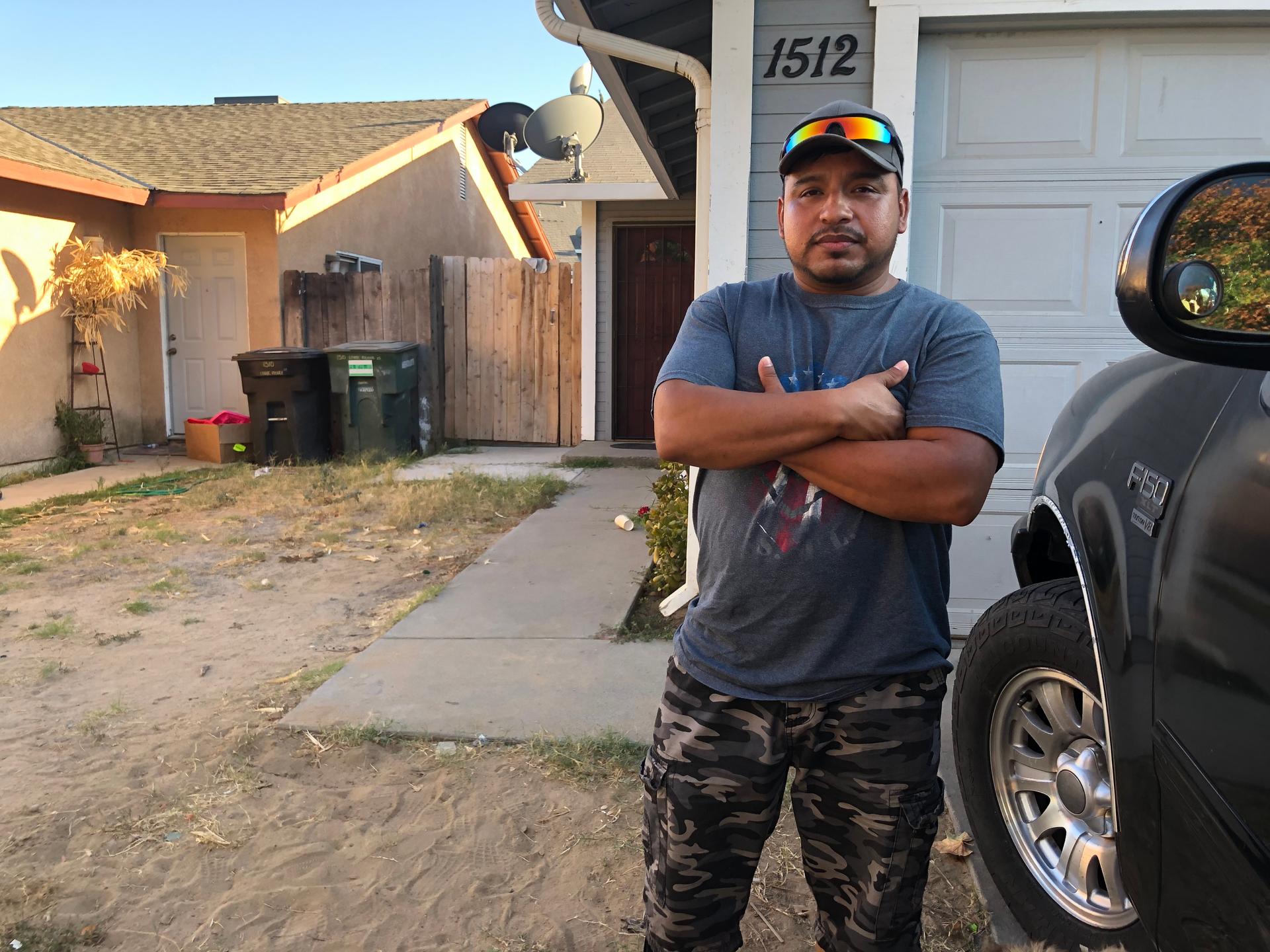Luis Alberto Echeverría, a former dairy farm employee in Turlock, California, sued his boss after he disregarded an on-the-job injury. Yet, after leaving a desposition for his case, Echeverría was detained by immigration agents and deported. He was eventually granted a U visa, for victims of certain crimes. In Echeverría’s case, his visa was approved based on obstruction of justice since he was deported while suing his employer.
The cow kicked hard, and fast, straight into Luis Alberto Echeverría’s chest. It was 2008, and Echeverría said he was prepping the cow for milking at the dairy farm he worked at in Turlock, California, east of San Francisco. The cow’s kick left him unconscious.
“When I came to, one of my co-workers was standing over me, fanning me, saying, ‘Wake up! Wake up!’” Echeverría said.
But when he told his boss, Joe Sallaberry, about what happened, he was ordered to keep working — through any pain. Sallaberry, who owned the dairy farm, did not believe he had been injured, and was still doubtful even after Echeverría returned from a hospital with painkillers and a doctor’s note saying he had a fractured rib, and needed rest.
Related: Trump administration plans rule change that allows indefinite detention for migrants
“He didn’t have a fractured rib,” Sallaberry said in a phone interview. “In fact, I called his doctor and I told him, ‘You gave him two weeks off!’ I said, “What the hell is the matter with you? He didn’t even get touched by a cow!” And he hung up the phone on me.”
That same week, Echeverría was fired. “Sure, I fired him,” said Sallaberry, who himself migrated from France in the 1950s.
Echeverría sued, asserting his employment rights, despite his immigration status. Originally from Michoacán, Mexico, Echeverría migrated to the US when he was 15, crossing the border into California without papers. He worked without legal status for years, including while he worked at Sallaberry’s farm.
As it turns out, Echeverría’s decision to take his boss to court would have major consequences — including eventual deportation. His story is just one example of the extra risks that undocumented workers face when asserting their employment rights, something that’s not new in the United States. Concerns are rising that more immigrant workers will fear retaliation and be discouraged from fighting for better working conditions given the Trump administration’s crackdown on immigrants — which includes more work-site enforcement.
“There was documentation to support the fact that he had got injured. The injury was on the job, and immediately thereafter, he was terminated from his employment.”
“There was documentation to support the fact that he had got injured. The injury was on the job, and immediately thereafter, he was terminated from his employment,” said Esmeralda Zendejas, a lawyer with California Rural Legal Assistance, a nonprofit that assists low-income workers, speaking about Echeverría’s case.
Echeverría also sued for unpaid overtime and no time allowed to eat or rest on the job. Then, his story took a turn.
After leaving a deposition, part of the legal fight against Joe Sallaberry Farms, Echeverría stopped for gas. That is when he said two people in plainclothes in an unmarked car asked him for identification. He had none. “They then put me in a van with bars inside of it, handcuffed me and took me away,” he said.
Echeverría said he did not know where he was going or who he was with. “I thought I was being kidnapped at first,” Echeverría said. More than an hour passed, he said, until the people identified themselves as Immigration and Customs Enforcement (ICE) officers. They mentioned that Echeverría had an old conviction for illegal gun possession and would be deported. That same day, Echeverría was flown to San Diego, deported to Mexico and left in Tijuana.
Related: Mexico: The ‘waiting room’ for thousands of migrants trying to get into the US
ICE declined to speak to The World about Echeverría’s story.
Echeverría said he believes his former boss’s lawyer told ICE where he would be the day of the deposition — that it was a setup. The address of the deposition was not disclosed to anyone other than the attending parties, according to Zendejas.
“So, if law enforcement contacted me about one of my neighbors, and they were suspicious that one of my neighbors was doing something illegal and they asked me to cooperate, I would cooperate.”
Sallaberry’s lawyer, Anthony Raimondo, has been accused of cooperating with ICE several times in cases involving immigrants suing his clients. Raimondo does not deny this. “I believe in a nation of laws,” he said in a phone interview. “So, if law enforcement contacted me about one of my neighbors, and they were suspicious that one of my neighbors was doing something illegal and they asked me to cooperate, I would cooperate.”
A chilling effect
In early August, more than 600 immigration agents descended outside of Jackson, Mississippi, and raided several poultry processing plants. Nearly 700 people were apprehended and bused away. Many people remain in detention centers.
More such operations are expected, a sentiment repeated after the raids by Mike Hurst, a US attorney for the Southern District of Mississippi, and Trump appointee: “For those who take advantage of illegal aliens, to those who use illegal aliens for competitive advantage or to make a quick buck, we have something to say to you. If we find that you have violated federal criminal law, we’re coming after you.”
Related: US and Mexico need to ‘work against a discourse of hate and racism,’ ambassador says
Yet, employers rarely face prosecution as a result of hiring immigrants without proper documentation. Only 11 employers were prosecuted from April 2018 to March 2019, according to a recent report by Transactional Records Access Clearinghouse (TRAC) at Syracuse University. During the same period, however, more than 85,000 individuals were prosecuted for illegal entry to the US, the report states.
“What’s happening is that their immigration status is being weaponized against them.”
“What’s happening is that their immigration status is being weaponized against them,” said Jessie Hahn, a labor and employment policy attorney with the National Immigration Law Center.
Hahn added that retaliation against immigrant workers harms other workers, as well.
“If you have this whole system set up in such a way that immigrant workers cannot speak freely about the problems because they are at risk of these types of enforcement actions or retaliation from their employers, that does not only damage them — that damages the other workers who are working under the same conditions,” she said.
Labor advocates worry that, apart from other direct consequences, raids can keep workers with legitimate complaints silent. “When raids like this happen, the workers there were likely already scared to begin with, and now they’re going to be that much more scared and that much less willing to speak up,” said Caitlin Berberich, managing attorney with Southern Migrant Legal Services in Nashville.
Related: A new Trump administration policy could lead to more US citizens being deported
She and other labor advocates hesitate to say definitely that the worksite raids in Mississippi were in direct retaliation to recent organizing and lawsuits led by workers at one of the main targeted facilities. “I don’t know what provoked it, I don’t know why they did it, but I still think at the end of the day, the chilling effect that it has on workers is the same either way,” Berberich said. “The US attorney and ICE made the choice to pursue enforcement action at a place that, I am certain, they did know had prior litigation. So, it sends the message either way to the workforce that if they stand up, if they assert their rights, if they speak out, this is one of the consequences that might come from that.”
In early August, WNYC reported on an undocumented man from China who sued the restaurant he worked at in Albany, New York, for back wages. While he was taking a lunch break during a deposition, ICE agents detained him. He is now fighting deportation from a detention cell in Buffalo, New York.
Fears of getting blacklisted
After he was deported, Echeverría was determined to return to California and his family. “I tried several times, kept trying and trying,” he said.
Ultimately, he crossed through a long water tunnel along the California-Mexico border: “I nearly drowned; the water was rising in the tunnel.”
Once on the other side, he said he dug a hole in the mud and waited until he could continue north undetected. When he got back to Modesto, California (near Turlock, where he used to work), he reconnected with his lawyer, Zendejas, and eventually received a U visa, granted to victims of certain crimes. In Echeverría’s case, his visa was approved based on obstruction of justice, since he was deported while suing his employer.
“I didn’t want any problems,” Echeverría said, looking back at the long, rocky story that transpired after confronting his boss. At first, he worried that standing up for himself might get him blacklisted by other farmers. “They all know each other, the farmers, not just in this county, but across counties, across the state.”
But Echeverría said that once he started the legal fight, he did not want to stop. He also wanted to set an example for his kids. “I needed to finish what I started,” he said.
But Echeverría understands why some immigrants might be unwilling to speak up like he did — particularly with the Trump administration’s anti-immigrant agenda.
“Right now, we can’t be sure what might happen tomorrow. People in this community are on edge and not just because of the raids we’re seeing on the news, what happened in Mississippi, but the hatred we saw in El Paso,” he said, referring to an attack at a Walmart in El Paso, Texas, on Aug. 3, which left 22 people dead. Before the killings, authorities believe the gunman posted an anti-immigrant, anti-Mexican manifesto online.
“We can’t be sure what might happen tomorrow. To be honest, if I could earn as much in Mexico as I make in the United States, I’d go back and take my kids with me.”
“We can’t be sure what might happen tomorrow,” Echeverría said. “To be honest, if I could earn as much in Mexico as I make in the United States, I’d go back and take my kids with me.”

Today, Echeverría works delivering cabinets in and around the San Francisco Bay Area. He said he likes the job and is done working at dairy farms. He rents a small home in Modesto, California, about 20 minutes away from the dairy farm where he was injured in 2008. He lives with his three children, all US citizens.
His oldest child, Alberto, is 19 and works in the fields. “I go wherever there is work,” he said.
This week, he is picking apples. He says he sometimes worries about his dad. “I kind of feel scared for him,” he said, adding, “I know he has a visa and all, but I worry that he could still get deported. He still isn’t a citizen like me.”
His dad responded, “Life is always like this. We take risks all of the time.”
He said his kids can feel vulnerable. Their mom passed away a few years ago, and they have few other relatives nearby. Echeverría is the main breadwinner.
Echeverría also knows his story is not an easy one. He confronted his boss — and got deported. “Maybe, by sharing my story, it’ll keep what happened to me from happening to others,” he said.
